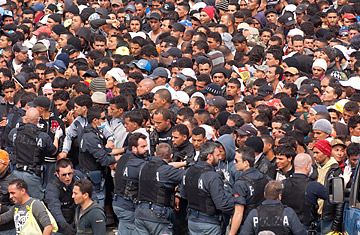
Crowds of immigrants from Tunisia wait for food distribution in Lampedusa, Italy, March 28, 2011
(2 of 2)
After two months in al-Zawiyah, Helen was transferred to another center, in the coastal city of Misratah. The facility was a bit cleaner, there was a yard outside, and the women were reunited with their men. But the beatings continued. "It's not like they say, 'Get in line,' " she said. "They just start hitting you." And there was a risk of rape by their captors. "If they like a girl, they take her, hitting her, and bring her to their office," she said. Men who objected were beaten severely and bound. In 2009, Human Rights Watch interviewed a Somali man who recounted being hit with sticks, hung from his legs and subjected to electric shocks on his arms and stomach after he tried to intervene to stop a rape.
Other migrants interviewed last week told TIME of similar experiences in Libyan detention centers. Many said they had been beaten. One man displayed an arm he said he could no longer bend after it was broken at the Misratah detention center. Another, Tsegay, 48, said his ship of 24 migrants was stopped by an Italian vessel in July 2010. He said the sailors gave him milk to drink, after which he fell suddenly asleep. "We woke up to the beatings of the Libyans," he said. Held in a prison in a suburb of Tripoli, he was often taken out to be interrogated. "They wait until you start to heal, and then they beat you again," he said. But the only question they asked was, "Why did you leave Libya, knowing that there's an accord between us and Italy?" Tsegay, a Christian, said he was forced to pray in the Muslim fashion and repeatedly pressed to convert to Islam. "Whatever abuse a normal person gets, you get twice as much if you're Christian," he said.
According to Human Rights Watch and testimony by the migrants, the Libyan detention system was largely arbitrary, with sentencing largely determined by how crowded the jails were. "There's no process," said Helen, who was released in February 2010. "They just take you to prison without telling you anything, without taking you to a judge." Tsegay said he was held until after the fighting in Libya began, when he was suddenly released: "They opened all the doors to the prison and said, 'Bye. Everybody go!' " Both al-Zawiyah and Misratah then became rebel strongholds, pummeled by the regime.
In the end, Italy's deal with Gaddafi never really stopped the flow of migrants. It merely postponed it. For nearly two years, Italy's immigration reception centers were empty. Today, they're overflowing. And while the outsourcing to Libya contributed to a sharp drop in asylum claims last year, it did so only at a sharp cost to human rights. "The accord with Libya disproportionately penalized those seeking asylum," says Laura Boldrini, spokeswoman for the United Nations High Commission for Refugees and the author of a book on the Italian program. Of all those who arrived in Italy by boat in 2008 before the pushbacks began, nearly 40% were granted some sort of protection on humanitarian grounds.
According to Human Rights Watch, European countries have struck similar pushback accords with Turkey and Ukraine, where migrants suffer comparable abuse. "Europe has been very much wiling to look the other way and let these partners do the dirty work," says Bill Frelick, director of Human Rights Watch's refugee program. Helen's experience before arriving in Italy reflects to some extent the mistrust with which the European electorate views immigrants, but her treatment since is reflective of a better side of public opinion. When Italian authorities on the island of Lampedusa discovered that Helen was pregnant, they flew her and two other women by helicopter to Agriento, Sicily, to receive medical attention. Like many of the new arrivals, she's delighted to have finally arrived in a place where she can petition for safety. "We're so happy," she says. "It's like we've been born for the second time." Italy should listen to its better angels.
